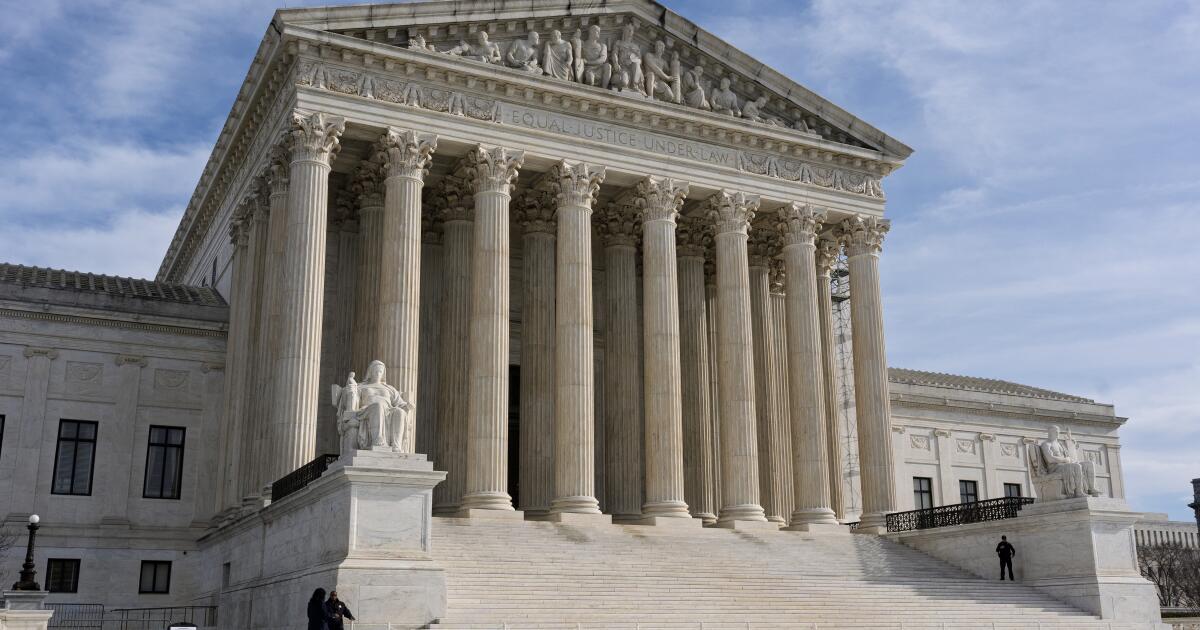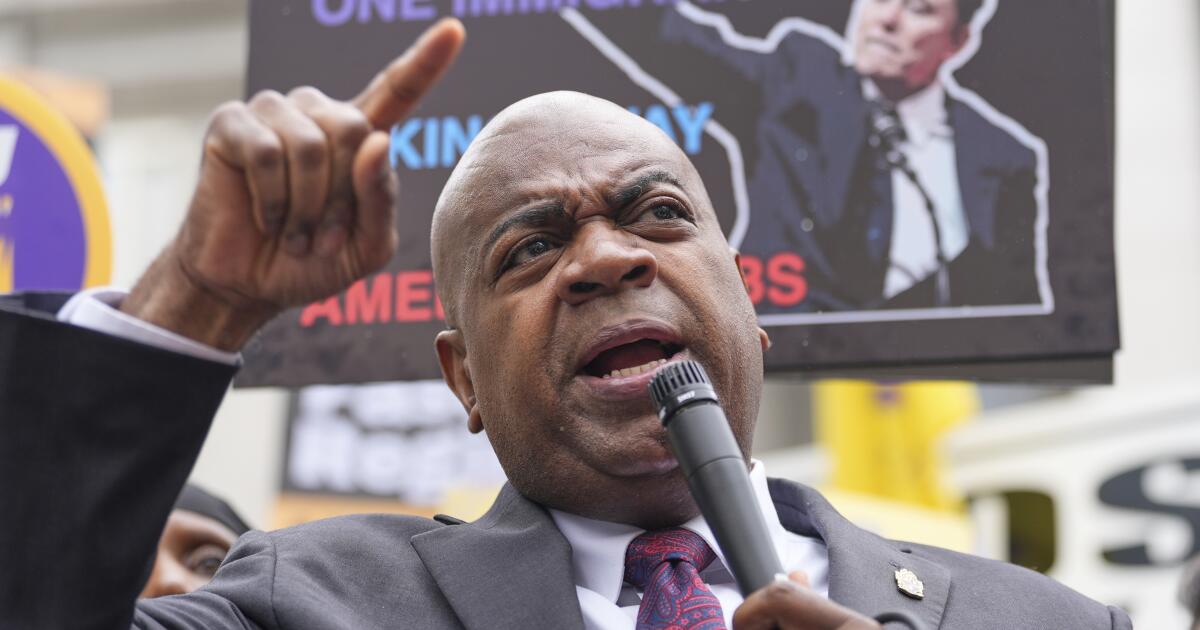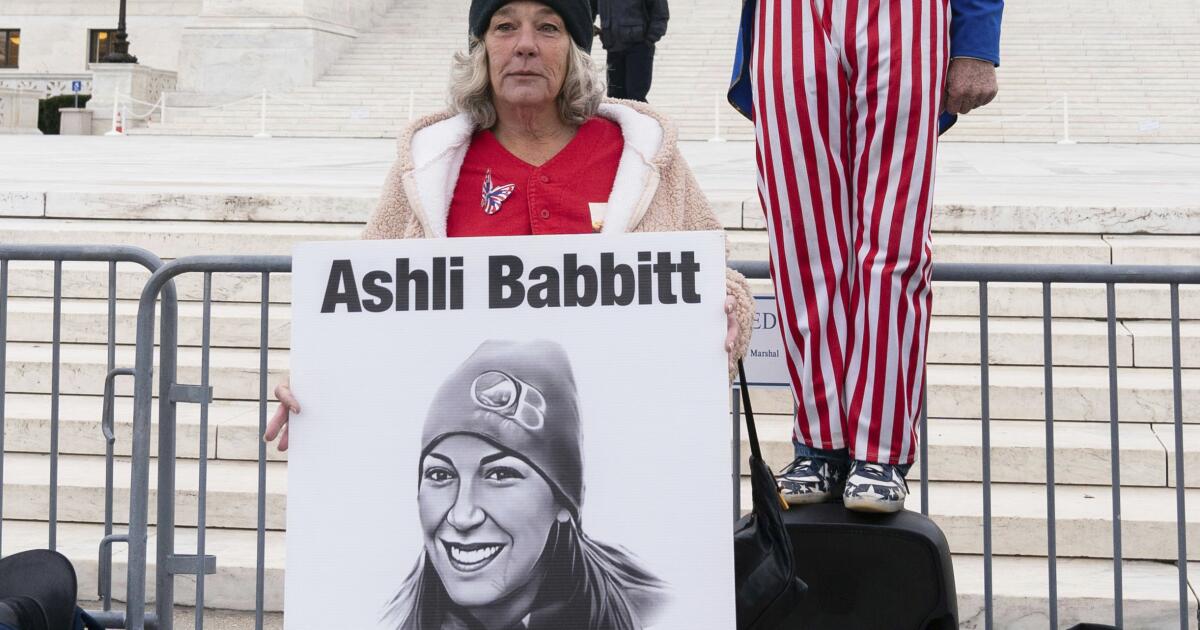In Palm Springs, the Alibi was a hot new music venue. Who killed it?
Back in the worst pandemic days of 2020, Elizabeth Garo and Melanie Tusquellas were terrified they would lose their nightclub.
The co-owners of the Alibi — an independent music venue with space for up to 300 people in downtown Palm Springs — opened in late 2019, just before COVID-19 shut down the live music scene.
Garo was a former booker for the Regent, Echo and Echoplex in L.A. (She also opened Stories Books in Echo Park.) Tusquellas was a hospitality veteran behind Los Feliz’s El Chavo and Silver Lake’s historic Edendale restaurant. The two said they had invested hundreds of thousands into renovating and opening the Alibi.
“It’s difficult to run a small independent venue any time, and during COVID it was particularly hard,” Garo recalled in an interview. “A lot of them didn’t make it.”
Garo heard that Marc Geiger, then a WME music executive she had known and worked with for decades, and former WME board member John Fogelman had founded Save Live, a company investing in independent venues to help them survive the pandemic.
When Save Live offered to buy 51% of the Alibi and let the co-founders continue to run it, the deal “felt like such a relief,” Garo said. “It felt like a lifeline, like, ’Hey, we’re gonna make it.’”
Instead, Garo and Tusquellas claim in a 2023 lawsuit and an interview with The Times that the partnership ruined them. Their lawsuit, which seeks compensatory damages, alleges that Geiger and Fogelman negotiated the deal in bad faith, forcing them out of the company’s operations soon after the purchase. After briefly reopening in 2022, the club permanently closed later that year. A trial is set for August.
Attorneys for Save Live, which has since rebranded as Gate 52, declined to comment when reached by email.
In a cross-complaint to the suit, Geiger and Fogelman say Save Live “bent over backwards to try to resolve the parties’ differences” and call Garo and Tusquellas’ claims “salacious — and utterly false — allegations of misogyny and bad faith.”
The suit raises questions about the future of local indie music venues like the Alibi and about Save Live’s intentions. Does the firm rescue troubled venues or capitalize on their financial vulnerability?
Gate 52 now owns 13 music venues across the country, including Electric City in Buffalo, N.Y., the Eagles Ballroom in Milwaukee and the Criterion in Oklahoma City. In California, the firm owns the Fremont Theater in San Luis Obispo and the Golden State Theatre in Monterey, and collaborates with dozens more “network venues” across the country.
The firm is a far cry from giants like Live Nation or AEG. But as a well-capitalized operation that has acquired majority stakes in struggling small venues, it has become a significant player in secondary markets.
The two-story, Spanish colonial-style building that would become the Alibi first opened as a switchboard hub for the GE Telephone Co. in the 1920s. Later, it became Georgie’s Alibi Azul, a popular gay bar and restaurant.
In 2018, Garo and Tusquellas, both wisecracking Gen X veterans of L.A. nightlife, were looking for “a swan song” for their careers, as Tusquellas described it. Garo, one of the most influential talent bookers in L.A. for decades, had been laid off from Live Nation after the mega-promoter bought local promoter Spaceland Presents.
After touring the Alibi, Garo and Tusquellas saw potential for a venue like the ones they’d built in L.A., a place to book local and global artists in a creatively adapted old building.
“We were surprised by how chic and international Palm Springs was becoming,” Tusquellas added. “Growing up in L.A., when we went to Palm Springs as kids, it was like God’s waiting room. But we were quite surprised by this scene with all these local musicians but no venues to play at.”
Alibi soft-launched with packed Pride events in fall 2019 (to avoid the summer heat), and formally opened in October. With its glazed-tile outdoor bar and emerald-hued mood lighting, the venue was a chic standout in desert nightlife.
“We had everything from ‘Dynasty’ theme parties to Modernism Week events,” Tusquellas said. “We had a goth night. There had never been a place to go for them in Palm Springs and they came out of the woodwork.”
Local musicians hoped the venue would be transformative for their scene.
“Alibi was the first place where we got a taste of the real deal,” said Spencer Stange of the band Host Family, which booked a monthly night of experimental music at Alibi. “It was the only venue I knew there that was legitimate and professional. Good bands played there and you could do a real sound check. They were so hospitable, it felt like a home base.”
Louise Minnick, a local promoter with Lesbo Expo, said Alibi was an important venue for queer women in the desert.
“Liz and Melanie went out of their way to make our events special,” Minnick said. “They offered their patio for women to have first access to watch Pride, which meant a lot to me.”
Five months later, the pandemic annihilated those plans.
Garo and Tusquellas said their company, 369 Palm Inc., was too new to access the federal patchwork of Paycheck Protection Program loans. They eventually got a grant from the National Independent Venue Assn., but it was for only $20,000. According to a slide deck cited in Save Live’s cross-complaint, the venue had $250,000 in outstanding bills from the shutdown.
“We used all our savings to pay the rent,” Tusquellas added. “We’re entrepreneurs who are not funded by big people, so we had to pay the $15,000 a month rent ourselves for a year and a half. It was really hard.”
Meanwhile, Save Live launched in 2020 with $135 million raised from venture capital firms and a clear mission: to buy majority stakes in small clubs.
“Save Live’s business model was to invest in local, independent, ‘mom and pop’ live music venues, providing critically needed financial relief and funds to renovate dated facilities to bring them back stronger than ever before,” the company says in its cross-complaint.
Save Live’s founders were well-known in L.A. entertainment. Geiger co-founded the Lollapalooza festival and led WME’s music division from 2003 until 2020. Fogelman was the former head of motion pictures at William Morris Agency and a founding board member when it merged with Endeavor to become WME. The Alibi was one of Save Live’s first venue deals.
“Being able to partner with Save Live is a dream come true,” Garo said in a 2021 announcement. The deal let the two owners “stay true to our roots knowing we have their full support. … It doesn’t hurt that we’ve known some of the people at Save Live for years — we all came up through the business together.”
“I didn’t know Marc at all, but he was very charming,” Tusquellas said. “He and Fogelman were titans of the industry. We felt that we were in very good hands. We knew what we were doing, and they knew that.”
According to the suit and cross-complaint, Garo and Tusquellas’ company, 369 Palm Inc. (with partner David Gold), agreed to sell 51% of their ownership of the Alibi’s business to Save Live for $400,000. The Alibi’s business would be co-owned under a new company, Alibi Venue Operations LLC. Garo and Tusquellas say in their suit that, under this agreement, the pair and Geiger “would have decision-making authority over the day-to-day operations.”
Garo and Tusquellas claim in their suit that 369 Palm “retained 100% ownership of [the Alibi’s] ABC liquor license” and would continue to manage the venue’s bar. Save Live agreed to provide $565,000 for renovations and expenses, according to Save Live’s cross-complaint.
Garo and Tusquellas’ suit claims that Save Live had “hatched a plan to exploit the weakness in the independent live music industry to try, by means of deception and then intimidation, to acquire The Alibi and its business without paying a fair price.”
Scott Timberlake, the Alibi building’s landlord, said he had a friendly relationship with Garo and Tusquellas. But once Save Live got involved, he said, “I was really surprised by Save Live’s ego and entitlement. When I asked to see their financial statements before taking over the lease, they lectured me about ‘Don’t you know who we are?’”
Garo and Tusquellas say in their suit that, when the venue reopened on April 1, 2022, “SL Alibi acted as if it were the sole owner.” They claim in their suit that Geiger and Fogelman contracted with an outside ticketing company, Tixr, without Garo’s consent, and that Save Live didn’t sufficiently fund day-to-day operations. Garo and Tusquellas claim in their suit that Save Live switched to its own accountant for bookkeeping and backed out of a plan to hire a general manager.
In its cross-complaint, Save Live says that “contrary to the claims in their lawsuit, Save Live did not try to take over the Venue.” Save Live says “Tusquellas and Garo had gone significantly over the pre-opening budget, resulting in … an operating budget shortfall.”
According to Save Live’s cross-complaint, private investigators discovered “a separate, undisclosed cash register used only for cash transactions … there was no record, whatsoever, of any such sales.” The cross-complaint alleges that Tusquellas “embezzled most of (if not all) of the cash sale proceeds.”
Tusquellas denied the embezzlement claims, saying all sales, including cash, were accounted for and reported as income.
Save Live says in its cross-complaint that both parties “always understood and intended for 369 to transfer” the venue’s valuable liquor license, and called Garo and Tusquellas’ refusal to do so “a ruse to get Save Live’s money.”
Garo and Tusquellas said they never sold, or intended to sell, the venue’s liquor license. “That may have been part of Save Live’s secret plan,” said 369 Palm’s lawyer, David Sergenian. “But that was never agreed to.”
On July 13, 2022, Garo and Tusquellas’ lawsuit says “Geiger and Fogelman called a meeting of the Board … as a pretense to ambush Tusquellas and Garo with false accusations. Geiger and Fogelman…falsely accus[ed] Tusquellas of embezzling funds from the company to enrich herself.”
“Fogelman aggressively threw a chair to the ground, as he raged,” the suit says. “Tusquellas and Garo were appalled by Fogelman’s shocking behavior and scared for their future, as he was threatening to ruin the business by shutting down The Alibi.”
Garo and Tusquellas’ suit claims Geiger and Fogelman ordered the venue shut down and that Garo and Tusquellas be removed from operations with their salaries cut off. The bar staff would be fired and 369 Palm’s concessionaire agreement canceled, according to the suit.
The Alibi closed on July 25, 2022. It never reopened.
The situation at the Alibi echoes the tumult surrounding the ownership of the beloved Pioneertown venue Pappy & Harriet’s. Starting in 2021, Knitting Factory Chief Executive Morgan Margolis and partners Stephen Hendel and John Chapman battled the venue’s co-partners, Joseph Moresco and Lisa Elin, about who controlled the operations at the rustic venue, where acts as big as Paul McCartney and Robert Plant have played in addition to hardscrabble desert locals. Margolis prevailed in late 2024.
Meanwhile, the new Acrisure Arena, built by mega-manager Irving Azoff and former AEG President Tim Leiweke, attracts A-list pop, rock and Latin acts to Palm Springs. The nearby Yaamava’ resort has spent millions on top talent.
“It’s great to have an influx of money and big artists at venues like Acrisure Arena that helps the Valley feel bigger. But losing small venues is detrimental and cuts away at the uniqueness of the experiences people have here,” said Kristen Dolan, executive director of the California Desert Arts Council, a nonprofit group advocating for cultural development in the Coachella Valley.
“Places like Alibi have a bigger impact than people think. The workforce here is largely in hospitality, and clubs like the Alibi are important places to start out,” Dolan said. “People were really upset when the Alibi closed, and it was heartbreaking for artists cultivating their community. The economy here is unstable right now and I hope we don’t lose more small venues like it.”

Former Alibi owners Liz Garo, left, and Melanie Tusquellas at Silver Lake’s Edendale restaurant.
(Annie Noelker / For The Times)
The post-pandemic future for such independent live venues is unsettled. Nonprofits like NIVA were effective advocates for legislation (like the $16.25 billion Shuttered Venue Operators Grant, a federal program that gave money to struggling venues) and fundraising, and concert attendance boomed once venues reopened. But inflation, reduced tourism and a volatile economy threaten to keep fans home.
“What word describes our situation right now? I would offer that one word is ‘unknown,” NIVA’s executive director Stephen Parker said at the group’s 2024 conference. “Forty years ago, independent stages were the norm, now multinational, publicly traded conglomerates are. Everyone in this room knows that competition is a misnomer and the increasing lack of it is, perhaps, our greatest threat.”
Meanwhile, Garo and Tusquellas have returned to L.A., picking up the pieces at an unexpectedly late phase of their careers. Garo will book shows at a new independent Yucca Valley venue, Mojave Gold.
Building owner Timberlake said that after months of fighting with Save Live over the venue’s debts, he accepted a settlement, and a new restaurant tenant has moved into the Alibi.
“I didn’t have the financial capability of fighting someone like Save Live,” he said. “It was just so unnecessarily negative.”
No matter how the August trial ends, Garo and Tusquellas are facing the same headwinds as the rest of the live industry. Only now, they are truly on their own.
“I have lots of ideas,” Garo said. “But that’s all kind of locked up until we get this resolved. I don’t want this to be my final chapter.”














